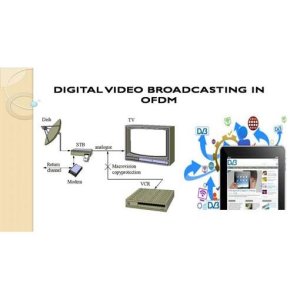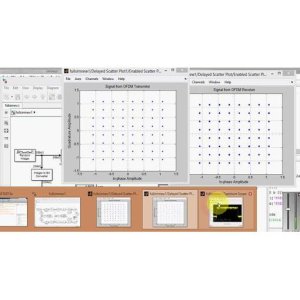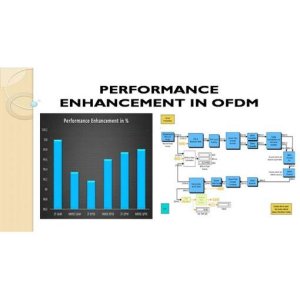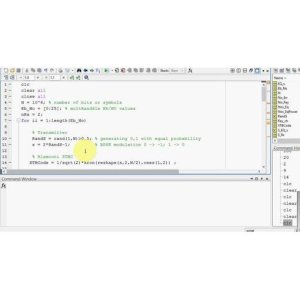"OFDM System Performance Analysis Using Digital Video Broadcasting Approach"
Problem Definition
Problem Description: One of the major problems in wireless communication systems is the issue of multipath propagation delay and fading that arise in Orthogonal Frequency Division Multiplexing (OFDM) systems. These factors can significantly degrade the quality of service provided to end users by causing errors in data transmission and reducing the reliability of the communication link. This project aims to address this problem by implementing a Digital Video Broadcasting (DVB-T) approach in OFDM systems. By broadcasting a multiplex of various services using DVB-T, the project aims to improve the spectral efficiency, reliability, and capacity of the wireless communication system. By utilizing this approach, the project seeks to minimize the impact of multipath propagation delay and fading, ultimately enhancing the quality of service delivered to end users.
Proposed Work
The project titled "Digital video broadcasting approach in OFDM system in wireless communication" focuses on improving the quality of service in wireless communication by utilizing Orthogonal Frequency Division Multiplexing (OFDM) techniques. OFDM is known for its high spectral efficiency, low implementation complexity, and less vulnerability to noise and distortion, making it suitable for reliable data transmission in wireless communication. The project specifically explores the use of Digital Video Broadcasting (DVB-T) systems, which have become a popular standard for digital television and broadcasting worldwide. By implementing the project in MATLAB software, the video stream is converted into binary data and subjected to different noise channels like Additive White Gaussian Noise (AWGN) and Rayleigh fading. The Bit Error Rate (BER) of each channel is calculated, allowing for analysis and comparison of different channels.
By using the Digital video broadcasting approach, the project aims to address challenges such as multipath propagation delay and fading in OFDM systems, ultimately improving the overall performance of wireless communication systems. This research falls under the categories of Digital Signal Processing, Latest Projects, MATLAB Based Projects, and Wireless Research Based Projects, with subcategories focusing on OFDM-based wireless communication, Latest Projects in MATLAB, and DVBT-based Projects.
Application Area for Industry
This project has the potential to be applied across various industrial sectors such as telecommunications, broadcasting, and wireless technology. In the telecommunications sector, implementing the proposed solutions can help improve the quality of service by enhancing spectral efficiency, reliability, and capacity of wireless communication systems. By addressing the challenges of multipath propagation delay and fading in OFDM systems, this project can benefit broadcasting industries by ensuring a more reliable and error-free transmission of digital video content. Additionally, in the wireless technology sector, the use of OFDM techniques and Digital Video Broadcasting (DVB-T) systems can significantly enhance data transmission and reception, leading to improved communication networks. Overall, the project's proposed solutions can be applied in industries where efficient and reliable wireless communication is essential, ultimately resulting in better performance and quality of service for end users.
Application Area for Academics
The proposed project, "Digital video broadcasting approach in OFDM system in wireless communication," offers significant potential for research by MTech and PhD students in the field of wireless communication. The project addresses the critical issue of multipath propagation delay and fading in Orthogonal Frequency Division Multiplexing (OFDM) systems, which can compromise the quality of service provided to end users. By implementing a Digital Video Broadcasting (DVB-T) approach in OFDM systems, the project aims to improve spectral efficiency, reliability, and capacity of the wireless communication system. MTech and PhD students can utilize this project to explore innovative research methods, simulations, and data analysis for their dissertations, theses, or research papers. By employing the code and literature from this project, researchers can delve into the study of OFDM-based wireless communication, MATLAB projects, and DVBT-based projects.
The project provides an opportunity for students to investigate the impact of different noise channels like Additive White Gaussian Noise (AWGN) and Rayleigh fading on data transmission, as well as analyze Bit Error Rate (BER) to compare the performance of various channels. The findings from this research can contribute to advancements in digital signal processing and wireless communication technologies. Furthermore, the project offers a reference for future scope in exploring cutting-edge solutions to enhance the reliability and efficiency of wireless communication systems.
Keywords
Wireless communication, OFDM systems, Digital Video Broadcasting, DVB-T, MATLAB software, spectral efficiency, multipath propagation delay, fading, reliability, capacity, data transmission, noise channels, Additive White Gaussian Noise, Rayleigh fading, Bit Error Rate, Digital Signal Processing, Latest Projects, MATLAB Based Projects, Wireless Research Based Projects, Linpack, Encoding, WSN, MANET, WiMAX, Channel, Digital Filter, Analog Filter, Signal Processing
| Shipping Cost |
|
No reviews found!



























































No comments found for this product. Be the first to comment!